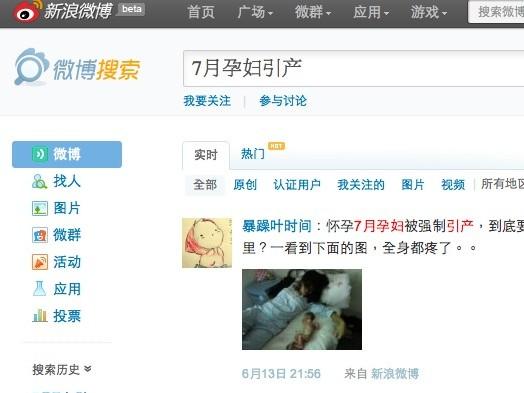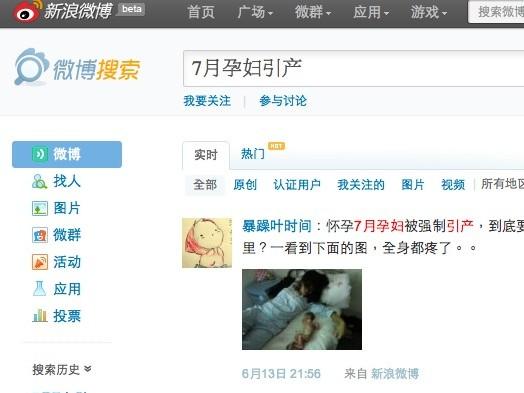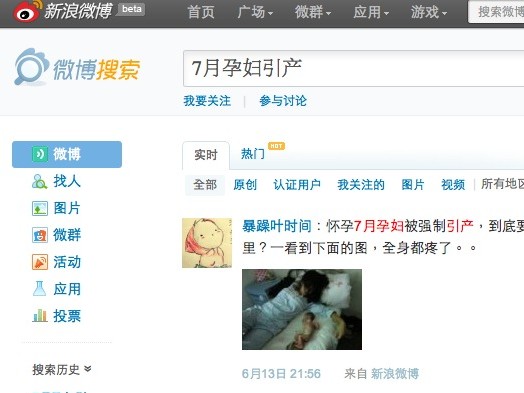Photos of a grieving mother lying beside her aborted seven-month-old child in a hospital in Ankang City, Shaanxi Province have caused outrage among Chinese Internet users, sparking debate about the regime’s one-child policy.
Feng Jianmei, the mother of the aborted child, was forcibly taken from her home by family planning officials on June 2, while her husband was away at work. Because she was pregnant with a second child—violating the country’s one-child policy—and could not pay the 40,000 yuan (US$6,270) fine levied against her, she was forced to have an abortion. The average yearly urban household income in China is 21,000 yuan (US$3,296).
On June 11 the human rights website 64Tianwang published the story with photos of the aborted child, and reaction on the Internet was intense. After just two days, over 300,000 comments were amassed using the search term “seven month pregnant woman abortion” on the microblog service Sina Weibo in China.
Initially, Ankang City officials defended the abortion, but on Thursday, June 14, the city demanded that the head of the family bureau in a nearby county and other officials step down, while an investigation takes place over the incident, according to China News, citing a statement issued by the local government. Ankang City’s local government was also said to have expressed a “deep apology” to Feng and her family as well as society.
U.S.-based China expert Cheng Xiaonong, a one-time assistant to former premier Zhao Ziyang, suggested the investigation and apology may not be what they seem.
“This is a way to put off the public’s criticism,” Cheng said. “After that, how it will be handled by the government is unclear.”
Chai Ling, the head of the U.S.-based group All Girls Allowed, which works to oppose the one-child policy and its tendency to promote “gendercide,” spoke with Feng and her husband Deng Jiyuan on the night of June 11.
Deng said that at the hospital his wife was held down and her head covered with a pillowcase. They inked her thumbprint and pressed it against the abortion consent form in order to show she had consented to the abortion.
They then injected toxins into the brain of the fetus. “I could feel the baby jumping around inside me all the time, but then she went still,” Feng said.
After a long, painful labor without anesthesia, the baby was stillborn early in the morning of June 4.
Chai said her organization has found that local family planning officials in the region where Feng lives have launched a forced abortions campaign in the past month.
The regime gave the officials a lower grade due to “over-quota births,” she added, pointing out that Feng’s case is an example of the region’s push to perform more abortions to meet the officials’ demands.
Netizens React
One Twitter user in China, with the handle Millennium Ginseng, said the perpetrators of the forced abortion “should be punished in accordance with international laws for homicide.”
Another Twitter user, Huang Qianhong, recalled his cousin receiving a late-term forced abortion from a local family planning bureau in 2009. That baby was about to be born within 10 days.
“To this day, she remains extremely thin and in poor health” due to physical and psychological complications from the forced abortion,” Huang tweeted.
Media reports from inside China say that Feng Jianmei has been psychologically traumatized after receiving the abortion.
Another Twitter user, with the name Tufu Wugan, saw the incident as indicative of the state of human rights in China.
“I admit that I was quite afraid to view the gruesome photos of the seven-month pregnant woman’s forced abortion in Shaanxi,” wrote Tufu Wugan. “Such a shameful act could only be committed in our country. Who dares to say that our human rights conditions are five times better than those in the United States?!”
Feng has retained a lawyer, Zhang Kai. The human rights website China Aid reports that Zhang has promised that if legal remedies inside China fail, he will “seek the help of international human rights groups, the United Nations and other groups, regardless of the political risk.”
The Epoch Times publishes in 35 countries and in 19 languages. Subscribe to our e-newsletter.







